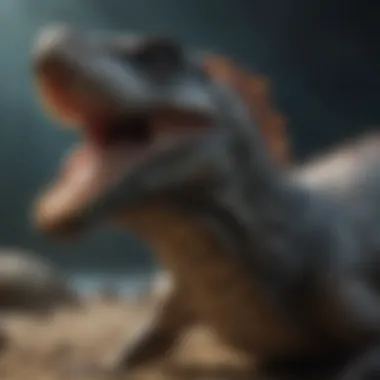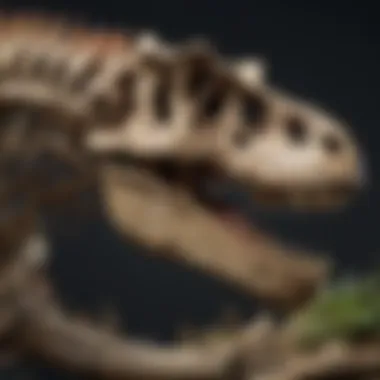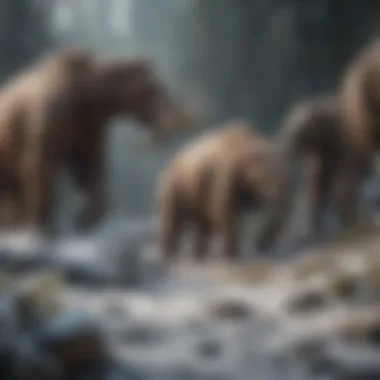Unveiling the Enigmatic Universe of Adult Fossil Kits: A Profound Exploration


Rock and Fossil Identification
In the fascinating world of adult fossil kits, understanding rock and fossil identification is paramount. Different types of rocks and fossils offer unique insights into the Earth's history, with each carrying distinct characteristics that reveal their origins. As enthusiasts embark on their paleontological journey, honing the skill of identification becomes crucial. Various tools, such as magnifying glasses, chisels, and brushes, aid in closely examining specimens and uncovering intricate details that may signal a rare find.
Collecting Tips and Techniques
Delving into the realm of collecting fossils requires a delicate balance of patience and precision. Enthusiasts are advised to follow best practices, such as documenting the location of each find, to contribute to scientific knowledge effectively. Locating prime collecting sites involves research and sometimes exploration, as different regions hold varying fossil treasures waiting to be unearthed. Once a specimen is located, safely extracting it from its environment without causing damage requires careful handling and specialized tools.
Preservation and Display
After the thrill of discovery comes the task of preserving rocks and fossils for future generations to marvel at. Techniques such as consolidation and jacketing help stabilize delicate specimens, ensuring their longevity. Proper storage methods involve controlling temperature and humidity levels to prevent deterioration over time. When it comes to creative display ideas, enthusiasts can showcase their collections in customized cabinets or shadow boxes, adding a touch of artistry to their scientific endeavors.
Geological Insights
Diving deeper into the geological aspects of rocks and fossils adds another layer of understanding to this immersive hobby. Exploring geological formations and the processes that shape them sheds light on the forces that have shaped Earth over millions of years. Understanding the historical significance of rocks and fossils opens a window into past ecosystems and climates, offering valuable insights into evolutionary processes. By studying notable discoveries in the field of paleontology, enthusiasts can parallel these findings with their own collections, enriching their appreciation for the Earth's ancient past.
Introduction to Fossil Kits
In the expansive world of paleontology, fossil kits hold a vital place as they cater not only to amateur enthusiasts but also to seasoned collectors with a profound curiosity for Earth's history. The introduction to fossil kits sets the stage for a captivating journey into the past, inviting individuals to explore and uncover ancient treasures through hands-on experiences. By providing a comprehensive overview of what fossil kits entail, this section sheds light on the practicality and educational value they offer to adults who seek to deepen their understanding of prehistoric life forms and geological processes.
Understanding Fossil Kits
Components of Fossil Kits
Delving into the core of fossil kits reveals a meticulous arrangement of essential tools and materials carefully curated to facilitate the excavation and study of ancient remnants. The components of fossil kits encompass a range of items such as chisels, brushes, magnifying glasses, specimen containers, and informative guides that aid in the identification and preservation of fossils. Each component plays a crucial role in enhancing the practicality and educational depth of the kit, empowering users to engage in detailed exploration and documentation of their findings. The presence of these components not only streamlines the excavation process but also imparts a level of authenticity and professionalism to the overall fossil collecting experience, making it a preferred choice for enthusiasts looking to enhance their paleontological pursuits.


Educational Value
The educational value embedded within fossil kits transcends mere excavation activities to encompass a holistic approach towards learning about Earth's ancient history. Through hands-on experiences facilitated by these kits, individuals gain practical insights into the principles of paleontology, geography, and evolution. By providing detailed information on fossil formation, classification, and historical significance, these kits serve as educational tools that bridge the gap between theory and practice, offering a dynamic learning environment for adults keen on expanding their knowledge base. The hands-on nature of fossil kits instills a sense of curiosity and exploration, fostering a deep appreciation for natural history and the intricate processes that have shaped the planet over millions of years.
Benefits for Adults
Adults engaging with fossil kits reap a multitude of benefits that extend beyond mere recreation, tapping into realms of cognitive stimulation, personal growth, and skill development. The hands-on nature of fossil excavation not only provides a sensory experience but also enhances cognitive functions such as observation, problem-solving, and critical thinking. Moreover, the patience and attention to detail required during fossil exploration serve as a form of mindful activity, offering stress relief and a therapeutic escape from daily pressures. As a hobby, fossil collecting promotes skill development in areas such as research, curation, and networking, empowering adults to cultivate a nuanced understanding of paleontology while fostering a sense of community among fellow enthusiasts.
Choosing the Right Fossil Kit
Fossil kits are not one-size-fits-all; hence, choosing the right one is imperative in embarking on a fulfilling paleontological journey. Selecting the appropriate fossil kit is a crucial decision for rock and fossil collectors aiming to deepen their understanding of Earth's ancient history and enhance their collection. In this section, we will delve into the specific elements, benefits, and considerations that underscore the significance of choosing the right fossil kit.
Factors to Consider
Complexity Level
The complexity level of a fossil kit plays a pivotal role in determining the extent of engagement and learning experience it offers. Kits vary in complexity, catering to individuals at different skill levels. Beginners may benefit from kits with simpler excavation processes and identification tasks, while advanced collectors might seek more intricate challenges. Understanding the complexity level ensures that the kit aligns with the collector's skill set and provides a rewarding experience.
Type of Fossils Included
The inclusion of specific fossil types in a kit influences the scope of exploration and learning opportunities available to the collector. Kits may focus on diverse eras or specific periods, allowing enthusiasts to delve deep into their area of interest. By considering the types of fossils included, collectors can tailor their experience to uncover fossils that intrigue them the most, broadening their paleontological knowledge in the process.
Additional Tools and Resources
Apart from fossils, the tools and resources included in a kit contribute significantly to the overall experience. Kits equipped with essential excavation tools, magnifying glasses, and field guides enhance the collector's ability to uncover, identify, and appreciate fossils. Additionally, access to online resources, such as virtual museums or forums, can further enrich the learning journey and facilitate knowledge sharing among collectors.
Popular Adult Fossil Kits


Best Kits for Beginners
Entry-level fossil kits for beginners are designed to provide a seamless introduction to the world of paleontology. These kits often feature simplified excavation processes, detailed instructions, and commonly found fossils that are easily identifiable. Ideal for novices, these kits offer a low barrier to entry and foster a strong foundation in fossil collection.
Advanced Kits for Experienced Collectors
Advanced fossil kits cater to seasoned collectors looking for a deeper and more challenging exploration experience. These kits may include complex excavation sites, rare fossil specimens, and in-depth research materials to cater to the expertise of experienced enthusiasts. By offering a higher level of complexity and intricacy, these kits keep experienced collectors engaged and continuously learning.
Specialized Kits for Specific Interests
For collectors with niche interests or a passion for particular fossil types, specialized kits provide a tailored experience. These kits focus on specific eras, species, or geological regions, allowing enthusiasts to delve into their preferred areas of study in greater detail. Whether it’s dinosaur fossils, marine life, or ancient plant specimens, specialized kits cater to the varied interests within the paleontological community.
Unpacking the Experience
Engaging in Fossil Excavation
Step-by-Step Process
The step-by-step process plays a pivotal role in the overall goal of fossil excavation. It breaks down the complex task of uncovering and handling fossils into manageable steps, ensuring a systematic approach to exploration. This methodical procedure allows for a detailed progression from excavation to identification, enhancing the learning experience for enthusiasts. Its structured nature promotes thoroughness and accuracy in fossil handling, making it a popular choice for individuals seeking in-depth involvement in paleontological activities.
Tools of the Trade
The tools of the trade are indispensable in fossil excavation endeavors. From brushes to chisels, each tool serves a specific purpose in the delicate process of uncovering and handling fossils. These tools contribute significantly to the overall effectiveness and efficiency of excavation activities, enabling enthusiasts to work with precision and care. Their unique features cater to the specific requirements of fossil handling, enhancing the quality of exploration while ensuring the safety of the specimens involved.
Safety Considerations


Safety considerations are paramount in the field of fossil excavation. Protecting both the collector and the specimens is vital in ensuring a successful and responsible engagement with paleontological activities. By embracing safety measures such as using protective gear and following excavation protocols, enthusiasts can minimize risks and safeguard the integrity of the fossils. These considerations play a pivotal role in creating a secure and enriching environment for individuals to explore the mesmerizing world of fossils.
Interpreting Fossil Discoveries
Identifying Fossil Types
Identifying fossil types is a fundamental aspect of interpreting fossil discoveries. It involves categorizing fossils based on their characteristics and origins, aiding in understanding the ancient species and ecosystems they represent. By honing skills in fossil identification, enthusiasts can deepen their knowledge of paleontology and make significant contributions to the field. The ability to discern various fossil types enhances researchers' capabilities in reconstructing the past and unraveling Earth's geological history.
Research and Documentation
Research and documentation are essential components of interpreting fossil discoveries. Conducting thorough research and documenting findings provide valuable insights into the significance of unearthed fossils. By delving into existing studies and recording observations, enthusiasts can contribute to the collective knowledge of paleontology. This meticulous approach ensures the preservation of crucial data for future reference and analysis, enriching the understanding of fossil specimens and their context.
Preservation Techniques
Preservation techniques are vital for maintaining the integrity of fossil discoveries. Proper preservation methods protect fossils from deterioration and damage, ensuring their longevity and scientific value. By applying suitable techniques such as stabilizing and storing fossils correctly, enthusiasts can safeguard these ancient remnants for future generations. These practices uphold ethical standards in fossil collection and contribute to the overall conservation of Earth's precious paleontological heritage.
Advancing Your Fossil Collection
In the captivating world of fossil kits for adults, the topic of Advancing Your Fossil Collection holds paramount importance. As enthusiasts progress in this hobby, their collection becomes not just a display of ancient gems but a reflection of their dedication to understanding Earth's history. By expanding their collection, enthusiasts immerse themselves deeper into the realm of paleontology, unlocking a treasure trove of knowledge and discovery. The process of advancing a fossil collection is more than just amassing fossils; it's a journey of growth, exploration, and learning that transcends time.
Building a Collection
Display and Curation
Within the scope of Advancing Your Fossil Collection, the aspect of Display and Curation plays a pivotal role. Displaying fossils is not merely about showcasing them; it is about storytelling through these ancient relics. Proper curation enhances the aesthetic appeal of the collection while preserving the integrity of each fossil. Effective display methods can range from DIY shadow boxes to professional museum-like arrangements, each reflecting the collector's unique style and preference. The meticulous curation and display of fossils not only create a visually stunning exhibit but also offer a systematic approach to cataloging and appreciating each piece's historical significance.
Networking with Fellow Collectors
Networking with Fellow Collectors is a cornerstone of advancing in the fossil collection community. Connecting with like-minded individuals opens doors to knowledge exchange, trading opportunities, and shared experiences. Engaging with fellow collectors provides access to insights on rare finds, innovative display techniques, and upcoming events or auctions. Furthermore, networking cultivates a sense of camaraderie within the community, fostering collaborations that can lead to joint collecting excursions or collaborative research projects. Through networking, collectors can expand their perspectives, grow their collection, and build lasting relationships with others who share their passion for paleontology.
Expanding Your Knowledge
Expanding Your Knowledge is a vital component of advancing in the world of fossil collection. As enthusiasts delve deeper into this field, their thirst for understanding grows alongside their collection. Researching new excavation techniques, studying various fossil types, and staying updated on paleontological discoveries all contribute to expanding one's knowledge base. By learning from experts, attending workshops, or engaging in online forums, collectors can broaden their understanding of fossils' geological context, evolutionary significance, and preservation methods. Knowledge expansion not only enriches the collector's experience but also equips them with the expertise needed to curate a diverse and well-informed fossil collection.







